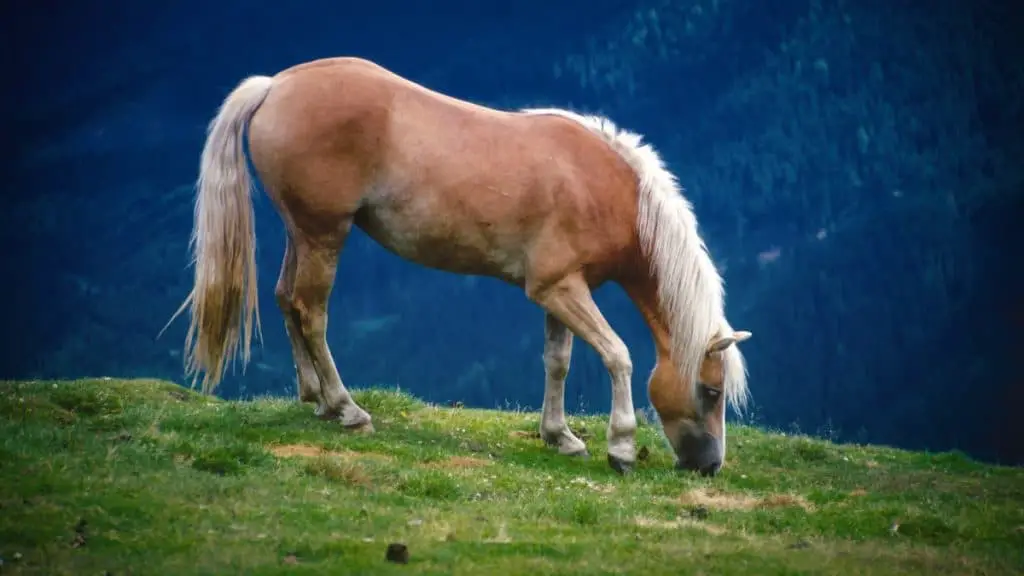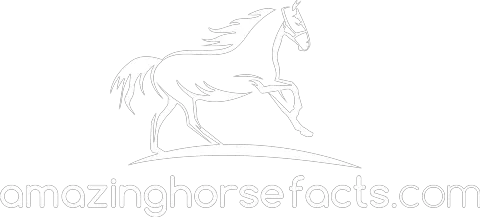Skip To Section
Horses are primarily herbivorous and live on a plant-based diet. They are by large grass-eating animals. Some free-living horses graze for 14 to 18 hours a day. Horses mainly eat grass, hay, and some concentrates, such as grain. As a species, horses do not eat any animal-based products.
Now, you may have come across stories where horses have been known to eat meat. How true are these stories?
Let’s find out.
Horse’s Teeth Are Made To Eat Plants
The skull of an animal determines what it is designed to eat. Horses have a jawline that is perfect for eating raw plant material. They have prominent incisors that help them graze. In fact, horses have 12 incisors that are easily able to cut through the grass. These incisors also help them hold on as they pull off leaves from the branches of trees.
Horses also have 12 premolars and 12 molars that help them grind tough leaves and stem. Horses’ teeth grow throughout their lives as they get worn out from chewing tough plant matter.
The canine teeth in horses are practically redundant. Most horses have none, while some may have up to four canine teeth. Canine teeth help tear flesh, and since most horses virtually have none, horses are not designed to eat meat.

The Equine Digestive System Is Designed To Be Herbivorous
The digestive system of a horse has been designed to turn grass into energy. The digestive system of a horse is both ruminant and non-ruminant. Horses use bacteria in their cecum and large intestine to ferment and digest fiber. A horse’s hindgut also works as a large fluid reservoir as fiber binds with water. Fiber tends to hold a lot of water, and a plant-based diet gives horses a lot of fiber.
The stomach of a horse can only hold a small amount and thus empties quickly. Food passes through their bodies at a rate of about one foot per minute, which is why horses graze for such a long period. The digestive system of a horse is such that it would not be able to survive on an omnivore diet.
What Does A Horse Diet Consist Of?
To keep your horse healthy, their diet should mainly consist of the following:
1. Grass
The grass is the natural food of horses and is great for their digestive system. However, when you leave out your horse to graze in the pasture, ensure that there are no harmful plants. Plants like ragwort, often found in pastures, can be harmful to horses.
2. Hay
When pasture isn’t available, like in the cooler months, hay is the next best thing for your horse. It keeps the digestive system working and the horse fuller for longer.
3. Fruits And Vegetables
Fruits and vegetables are great for horses as they add the necessary moisture to the feed. However, stone fruits must be avoided as the horse may choke on the pit. Also, vegetables like turnips, potatoes, tomatoes, kale, broccoli, and cabbage must be avoided as they can make your horse gassy.
4. Concentrates
Concentrates that are grains, like corn, oats, and barley, are good for your horse. You should especially include concentrates in your horse’s diet if it is competing or pregnant. Concentrates are also recommended for old, young, and nursing horses.
5. Salt
Horses love eating salt. You may give your horse a salt block to lick or some loose salt in a separate container.
Do Horses Eat Meat?
Horses do not actively seek out meat. They may eat meat only if it is fed to them. For instance, feeding horses dried fish is a common practice in winters in Iceland. The meat, apparently, provides them the extra protein needed to survive the harsh winters.
However, should horses be fed meat? No.
The digestive system of horses is such that they cannot vomit. Meat tends to go bad quickly, and some toxins in meat do not get destroyed even after cooking. Since it cannot vomit to expel the toxins, meat can cause the horse serious harm.
If you need more information on whether horses eat meat, click here.
Conclusion
Looking at a horse’s jawline and digestive system, we can say that a horse is designed to be herbivorous. Even if it can occasionally eat a little meat, it doesn’t mean that it should. What horses really need is plenty of good quality roughage and clean water to keep them hale and hearty.

